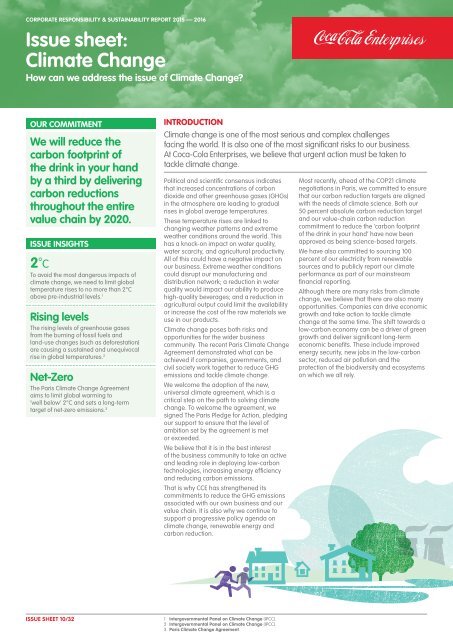Corporate Responsibility & Sustainability Report 2015/2016
1XlqBpD
1XlqBpD
You also want an ePaper? Increase the reach of your titles
YUMPU automatically turns print PDFs into web optimized ePapers that Google loves.
CORPORATE RESPONSIBILITY & SUSTAINABILITY REPORT <strong>2015</strong> — <strong>2016</strong><br />
Issue sheet:<br />
Climate Change<br />
How can we address the issue of Climate Change?<br />
OUR COMMITMENT<br />
We will reduce the<br />
carbon footprint of<br />
the drink in your hand<br />
by a third by delivering<br />
carbon reductions<br />
throughout the entire<br />
value chain by 2020.<br />
ISSUE INSIGHTS<br />
2°C<br />
To avoid the most dangerous impacts of<br />
climate change, we need to limit global<br />
temperature rises to no more than 2°C<br />
above pre-industrial levels. 1<br />
Rising levels<br />
The rising levels of greenhouse gases<br />
from the burning of fossil fuels and<br />
land-use changes (such as deforestation)<br />
are causing a sustained and unequivocal<br />
rise in global temperatures. 2<br />
Net-Zero<br />
The Paris Climate Change Agreement<br />
aims to limit global warming to<br />
‘well below’ 2°C and sets a long-term<br />
target of net-zero emissions. 3<br />
INTRODUCTION<br />
Climate change is one of the most serious and complex challenges<br />
facing the world. It is also one of the most significant risks to our business.<br />
At Coca-Cola Enterprises, we believe that urgent action must be taken to<br />
tackle climate change.<br />
Political and scientific consensus indicates<br />
that increased concentrations of carbon<br />
dioxide and other greenhouse gases (GHGs)<br />
in the atmosphere are leading to gradual<br />
rises in global average temperatures.<br />
These temperature rises are linked to<br />
changing weather patterns and extreme<br />
weather conditions around the world. This<br />
has a knock-on impact on water quality,<br />
water scarcity, and agricultural productivity.<br />
All of this could have a negative impact on<br />
our business. Extreme weather conditions<br />
could disrupt our manufacturing and<br />
distribution network; a reduction in water<br />
quality would impact our ability to produce<br />
high-quality beverages; and a reduction in<br />
agricultural output could limit the availability<br />
or increase the cost of the raw materials we<br />
use in our products.<br />
Climate change poses both risks and<br />
opportunities for the wider business<br />
community. The recent Paris Climate Change<br />
Agreement demonstrated what can be<br />
achieved if companies, governments, and<br />
civil society work together to reduce GHG<br />
emissions and tackle climate change.<br />
We welcome the adoption of the new,<br />
universal climate agreement, which is a<br />
critical step on the path to solving climate<br />
change. To welcome the agreement, we<br />
signed The Paris Pledge for Action, pledging<br />
our support to ensure that the level of<br />
ambition set by the agreement is met<br />
or exceeded.<br />
We believe that it is in the best interest<br />
of the business community to take an active<br />
and leading role in deploying low-carbon<br />
technologies, increasing energy efficiency<br />
and reducing carbon emissions.<br />
That is why CCE has strengthened its<br />
commitments to reduce the GHG emissions<br />
associated with our own business and our<br />
value chain. It is also why we continue to<br />
support a progressive policy agenda on<br />
climate change, renewable energy and<br />
carbon reduction.<br />
Most recently, ahead of the COP21 climate<br />
negotiations in Paris, we committed to ensure<br />
that our carbon reduction targets are aligned<br />
with the needs of climate science. Both our<br />
50 percent absolute carbon reduction target<br />
and our value-chain carbon reduction<br />
commitment to reduce the ‘carbon footprint<br />
of the drink in your hand’ have now been<br />
approved as being science-based targets.<br />
We have also committed to sourcing 100<br />
percent of our electricity from renewable<br />
sources and to publicly report our climate<br />
performance as part of our mainstream<br />
financial reporting.<br />
Although there are many risks from climate<br />
change, we believe that there are also many<br />
opportunities. Companies can drive economic<br />
growth and take action to tackle climate<br />
change at the same time. The shift towards a<br />
low-carbon economy can be a driver of green<br />
growth and deliver significant long-term<br />
economic benefits. These include improved<br />
energy security, new jobs in the low-carbon<br />
sector, reduced air pollution and the<br />
protection of the biodiversity and ecosystems<br />
on which we all rely.<br />
ISSUE SHEET 10/32<br />
1 Intergovernmental Panel on Climate Change (IPCC).<br />
2 Intergovernmental Panel on Climate Change (IPCC).<br />
3 Paris Climate Change Agreement.


